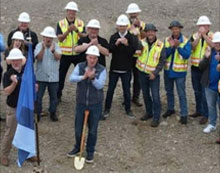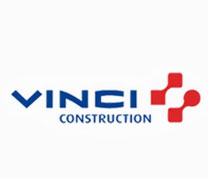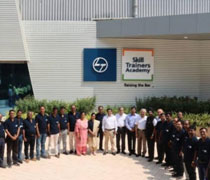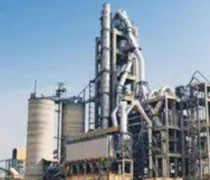Optimization
- Home
- Optimization
BUSINESS OPTIMIZATION

_____________
BUSINESS OPTIMIZATION BASED OPERATIONAL EXCELLENCE
_____________
BUSINESS OPTIMIZATION IN CONSTRUCTION INDUSTRY AND OTHER
_____________
Construction Industry
→
_____________________________
OPERATIONAL
EXCELLENCE OF
CONSTRUCTION AND ENGINEERING INDUSTRY
Optimization in Construction Industry

The construction industry is one of the most complex and challenging industries in the world. To succeed in this industry, companies need to operate with a high level of efficiency and effectiveness, while maintaining a strong focus on quality and safety following the path to optimization.
Optimising strategies and techniques
Continuous improvements
→
Lean principles
→
Advance technology
→
Safety
→
VINCI Construction builds all kinds of mobility infrastructure, applying circular economy principles to both materials production and construction works. Its expertise also covers urban development projects, energy infrastructure, water treatment and transmission infrastructure, and ecological engineering.
Operational excellence is a business philosophy that emphasises the continuous improvement of processes and systems to achieve the highest level of efficiency and effectiveness. In the construction sector, operational excellence can be achieved by adopting a range of strategies and techniques.
One of the key strategies of operational excellence in the construction sector is the use of Lean principles. Lean principles involve identifying and eliminating waste in all aspects of the construction process, including materials, time, and resources. By adopting Lean principles, construction companies can reduce costs, improve quality, and enhance customer satisfaction.
Another important strategy of operational excellence in the construction sector is the use of advanced technology. From Building Information Modeling (BIM) to drones and 3D printing, technology can be used to optimize processes, reduce waste, and improve safety. By adopting the latest technology, construction companies can stay ahead of the competition and deliver projects more efficiently and effectively.
Operational excellence also involves a strong focus on safety. Safety is a top priority in the construction industry, and companies that prioritize safety are more likely to succeed in the long term. By adopting best practices in safety management and providing regular training to employees, construction companies can ensure that safety remains a top priority throughout the organization.
One of the key benefits of operational excellence in the construction sector is that it can help to enhance the reputation of the company. By delivering projects more efficiently and effectively, while maintaining a strong focus on safety and quality, construction companies can build a strong reputation in the industry and attract new customers.
Overall, operational excellence is a critical component of success in the construction industry. By adopting strategies and techniques that emphasize efficiency, effectiveness, safety, and quality, construction companies can optimize their operations, reduce costs, and enhance customer satisfaction.
Optimizing business operations

Bechtel Corp (Bechtel) is a provider of engineering, construction, and project management services. Its major services include construction, master planning, tunnelling, finance, engineering, procurement, sustainability solutions and feasibility studies.
Optimising business operations can seem like a lofty goal in the construction industry. From supply chain issues to labor shortages and project performance to cash flow, there are a lot more moving parts here than in many other industries. That said, it is possible to optimize your business through small continuous improvements like reducing waste, improving costs, and maximizing human potential.
Continuous improvement is a part of optimizing business operations, which champions executing business strategy more effectively and consistently than the competition. But operational excellence goes further, highlighting the importance of every employee being able to identify and deliver value to the business. This article sets out to demystify operational excellence and encourage you to incorporate its principles into your business operations.
At the heart of it, operational excellence means that all employees understand their contribution to the flow of the business and can identify and correct any blockers to that flow. This removes the need for management to deal with smaller day-to-day business issues and allows them to focus on strategy and growth.
Assure quality at the source
→
Improve flow and pull
→
Seek perfection
→
Embrace scientific thinking
→
Focus on process
→
Optimising workplace culture

LENNAR
Lennar Corporation is a home construction company based in the Waterford District, an unincorporated area of Miami-Dade County, Florida (with a Miami, Florida postal address). As of 2023, the company was the second-largest home construction company in the United States based on the number of homes sold.
The workplace culture is the most important part of operational excellence. When employees feel respected they are happier and work harder. From top executives to junior employees, everyone should feel respected and valued in their role and the workplace. Leadership should seek input from employees and listen to ideas and criticism for the culture of respect to thrive.
Everyone in the business should be willing to experiment, learn, fail at new ideas, and try again. This cycle is necessary for there to be true innovation and growth. Processes are great, but when they are old, tired out, or not working, they will result in poor quality.
Optimising enterprise alignment

Leadership
→
Teamwork
→
Problem-solving
→
L&T ‘s capabilities span the entire gamut of construction – civil, mechanical, electrical and instrumentation engineering – and its services extend to all core sector industries and infrastructure projects.
Leadership
With operational excellence, the traditional leadership structures operating in a top-down fashion are rejected. Employees in each department are empowered to respond to any blockers and issues they identify and make the best call. This allows for a company to keep the flow of value moving rather than being stuck waiting for approvals.
In this style, rather than being involved in every decision and potentially slowing down progress, the leadership team manages the company’s strategic decisions and provides the resources and training needed for all employees to succeed. For this to work, there needs to be a high level of transparency where employees have access to relevant information to make informed decisions.
Teamwork
Teams should be connected and communicative, understand how they work together, and strive to work together better. Optimization and improvements only work on processes when leadership understands how the business works. Further, each member of every team should know and understand the purpose and trajectory of the business. When they have internalized this knowledge, the risks they take will be made with confidence and assuredness, and a culture of innovation and action will be born.
There is no shortcut to achieving operational excellence. Quality work is guaranteed when every element of a job is completed correctly. In construction, this means different departments—from the office to the field—need to be connected and communicative. This type of business organization will allow potential blockers to be found and dealt with effectively and efficiently.
Having connected systems allows your teams to work together seamlessly, learn from past performance, and make informed decisions on future ones, allowing for better resource planning and smoother workflows.
Of course, this teamwork needs to be facilitated by clear processes. Every team must understand their place in the business, what their role is, and who they need to work closely with to achieve the business’ goals.
Problem-solving
Active problem solving is key to operational excellence. It requires all levels of the workforce to understand what the business goals are and continuously strive toward them. When everyone understands how the company operates, it becomes easier to flag errors or blockers and course-correct effectively.
Embrace progress, improvement, and problem-solving in the workplace by putting in place a system that allows for cross-departmental collaboration and innovation.
Think systemically
→
Create value for the customer
→
Create constancy of purpose
→
VINCI | LENNAR |
D. R. HORTON | BECHTEL |
L & T | SKANSKA |
_____________________________
Our consulting on business optimization is managed by a dedicated team from France.

_____________________________
In business, optimization is the process of fine-tuning a business strategy or process in order to improve efficiency or reduce costs. This can be done by using resources more efficiently, cutting costs, or investing in labor-saving technologies.
Optimization can be used in Manufacturing plants to figure out how to best run their machinery, to buy raw materials. Airlines and other passenger transportation services use optimization to determine their schedules. Optimization plays a vital role in almost every sectors.
Production optimization comprises a range of activities related to measuring, analyzing, modeling, prioritizing, and implementing actions to enhance productivity.
France is recognized for its luxury goods, fashion, and cosmetic industries. Many large and multinational companies are also based in France such as Airbus, Renault, Ubisoft, Michelin, AXA, and Danone.
Tourism, manufacturing, and pharmaceuticals lead France’s diversified economy. The government has partially or fully privatised many large companies but maintains a strong presence in such sectors as power, public transport, and defense.
If you think of solving your industry’s business optimization challenges, you can leverage our consulting team from France. They have deep, and relevant knowledge of aviation and defense, power, public transport, manufacturing, tourism, pharmaceuticals, and fashion and cosmetics. |

CONSTRUCTION INDUSTRY |
AVIATION AND DEFENSE INDUSTRY |
FASHION AND COSMETICS INDUSTRY |
TOURISM INDUSTRY |
PUBLIC TRANSPORT INDUSTRY |
POWER INDUSTRY |
MANUFACTURING INDUSTRY |
_____________________________
HOW CAN WE HELP OUR CLIENTS ON BUSINESS GROWTH
Business Growth Lesson 1

Higher Education
We can identify and fix any specific challenges in a university on the sources of income, quality development, infrastructure development, organisational culture development, brand development, and global, and local networking and partnerships.
_______________________
Business Growth Lesson 2
Autonomous Vehicles Industry

We can identify and fix your challenges with- simulation driven design, consortium development, driver assistance technology, vehicle platooning, and R&D,investments and developments.
_______________________
Business Growth Lesson 3

Tourism Industry
We can identify and fix your tourism challenges on – tourism vision development, quality tourism infrastructure development, tourism safety and security, demand driven tourism, sustainable tourism, and medical tourism.
_______________________
Business Growth Lesson 4

Aviation Industry
We can identify and solve your challenges of – aviation industry accountability in setting a standard, consistency in serving customer needs, sharing of vital information, and adapting to chaotic times.
_______________________
Business Growth Lesson 5

Real Estate Industry
We can identify your challenges and opportunities and build an operational business model for you with a real estate corporate strategy, portfolio strategy and growth, asset management, financial market and regulations, and technology and digitalization.
_______________________
Business Growth Lesson 6

Iron and Steel Industry
We can identify and fix any specific challenges in a steel industry on the steel innovation, steel technology, steel hub, and steel quality development.
_______________________
Business Growth Lesson 7

Textiles Industry
We can identify and fix your challenges with- business expansion, and equity value creation.
_______________________
Business Growth Lesson 8

Cement Industry
We can identify and fix your cement industry challenges on – increase in revenue, customer base, and market share.
_______________________
Business Growth Lesson 9

Petrochemicals Industry
We can identify each type of business growth and solve your challenges of – petrochemicals industry, and mainly focus on partnership business growth.
_______________________
Business Growth Lesson 10

Automobile Industry
We can identify your challenges and opportunities in the growth stage of the automobile industry and fix them.
_______________________
Business Growth Lesson 11

IT Industry
We can identify your challenges and opportunities in the IT industry in terms of quick growth.
____________________________
Business Growth Lesson 12

Banking Industry
We can identify and fix any specific challenges in a bank on the new sources of income, quality development, infrastructure development, organisational culture development, brand development, and global, and local networking and partnerships.
_______________________
Business Growth Lesson 13

Insurance Industry
We can identify and fix your challenges with- reaching the point for expansion, equity value creation, focus on innovative products, and scaling and expanding quickly.
_______________________
Business Growth Lesson 14

Hospitals Industry
We can identify and fix your hospital challenges on increased competition in hospitals and focus on competitiveness of hospitals.
_______________________
Business Growth Lesson 15

Pharmaceuticals Industry
We can identify and solve your challenges of – partnership pharmaceuticals business growth.
_______________________
Business Growth Lesson 16

Retail Industry
We can identify your challenges and opportunities in retail industry and focus on growth stage retail industry.
_______________________
Business Growth Lesson 17

Logistics and Transportation
Industry
We can identify your challenges and opportunities in logistics and transportation industry and focus on building quick business growth.
_______________________
Business Growth Lesson 18

Power and Energy Industry
We can identify your challenges and opportunities in the power and energy industry and focus on strong financial capabilities, expanding the production capabilities locally, improvement of current production technology to increase production efficiency, competitive inventory cost, and strengthening outbound logistics network.
_______________________
Business Growth Lesson 19

Venture Capital Industry
We can identify and fix any specific challenges in a venture capital industry on the development of its competitive advantage.
______________________________